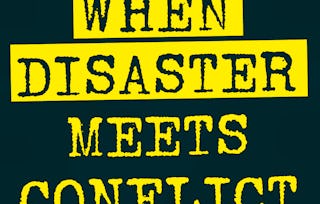The Paradoxes of War teaches us to understand that war is not only a normal part of human existence, but is arguably one of the most important factors in making us who we are. Through this course, I hope that you will come to appreciate that war is both a natural expression of common human emotions and interactions and a constitutive part of how we cohere as groups. That is, war is paradoxically an expression of our basest animal nature and the exemplar of our most vaunted and valued civilized virtues. You will learn some basic military history and sociology in this course as a lens for the more important purpose of seeing the broader social themes and issues related to war. I want you to both learn about war, but more importantly, use it as way of understanding your everyday social world. So, for example, the discussion of war and gender will serve to start you thinking about how expectations of masculinity are created and our discussion of nationalism will make clear how easy “us-them” dichotomies can be established and (ab)used. I will suggest some readings for you to complement the class and assign some activities through which you will be able to apply the theoretical insights from the course to your observations of everyday life. At the end of the course, you will start to see war everywhere and come to appreciate how much it defines our life.

Paradoxes of War

706 reviews
Skills you'll gain
Details to know
See how employees at top companies are mastering in-demand skills

There are 13 modules in this course
The basic paradoxes of war: how it builds and destroys, produces love and hate are discussed. Outline of course and general expectations.
What's included
1 video1 reading
War is a product of both “natural” instincts and a social creation involving the imposition of organization and authority structures.
What's included
5 videos
Causes of war may be described as material, cultural, and psychological. At the heart of war is the product of us-them dynamics.
What's included
5 videos
In order to understand the social creation of war we need to appreciate that this is an activity VERY few would engage in with control or inducement.
What's included
7 videos
Warriors are taught a set of values of which duty and honor are fundamental. These are taught through the imposition of discipline.
What's included
7 videos
Wars are about organized violence and this part of the course traces the managerial and technological developments necessary to culminate in total wars.
What's included
7 videos
Historical overview of battle formations from phalanx to gunpowder revolution to industrialized war.
What's included
7 videos1 peer review
Wars can also be about societal survival and we look at three examples: conquest, genocide, and strategic bombing.
What's included
8 videos
Wars help build states and nationalism
What's included
4 videos
Wars also develop citizenship and democratic demands
What's included
5 videos
While the West was dominant for 500 years, beginning in 1945 new forms of war have challenged the technological and organizational supremacy of old empires.
What's included
5 videos
Wars are not fought as they were yet militaries are still organized anachronistically.
What's included
4 videos
Summary of the class.
What's included
2 videos1 peer review
Instructor

Offered by
Explore more from Governance and Society
 Status: Free
Status: FreeErasmus University Rotterdam
 Status: Preview
Status: PreviewStanford University
 Status: Preview
Status: PreviewColumbia University
 Status: Free Trial
Status: Free TrialTecnológico de Monterrey
Why people choose Coursera for their career

Felipe M.

Jennifer J.

Larry W.

Chaitanya A.
Learner reviews
- 5 stars
73.61%
- 4 stars
20.42%
- 3 stars
3.12%
- 2 stars
0.70%
- 1 star
2.12%
Showing 3 of 706
Reviewed on Feb 23, 2016
A good course and very interesting perspectives. A pity Princeton does not issue certificates.
Reviewed on May 30, 2023
It's a very interesting course, i've heard and understood a lot of new and interesting things.
Reviewed on Jun 18, 2022
Great course to understand the war, its nuances, and most importantly its effect on shaping societies.

Open new doors with Coursera Plus
Unlimited access to 10,000+ world-class courses, hands-on projects, and job-ready certificate programs - all included in your subscription
Advance your career with an online degree
Earn a degree from world-class universities - 100% online
Join over 3,400 global companies that choose Coursera for Business
Upskill your employees to excel in the digital economy
Frequently asked questions
No. As per Princeton University policy, no certificates, credentials, or reports are awarded in connection with this course.
To access the course materials, assignments and to earn a Certificate, you will need to purchase the Certificate experience when you enroll in a course. You can try a Free Trial instead, or apply for Financial Aid. The course may offer 'Full Course, No Certificate' instead. This option lets you see all course materials, submit required assessments, and get a final grade. This also means that you will not be able to purchase a Certificate experience.
More questions
Financial aid available,
¹ Some assignments in this course are AI-graded. For these assignments, your data will be used in accordance with Coursera's Privacy Notice.

